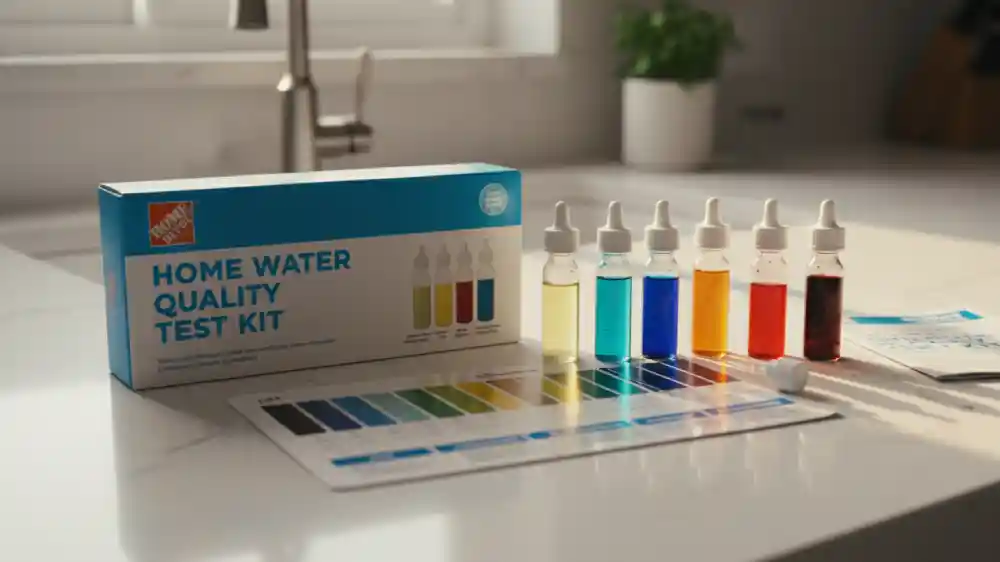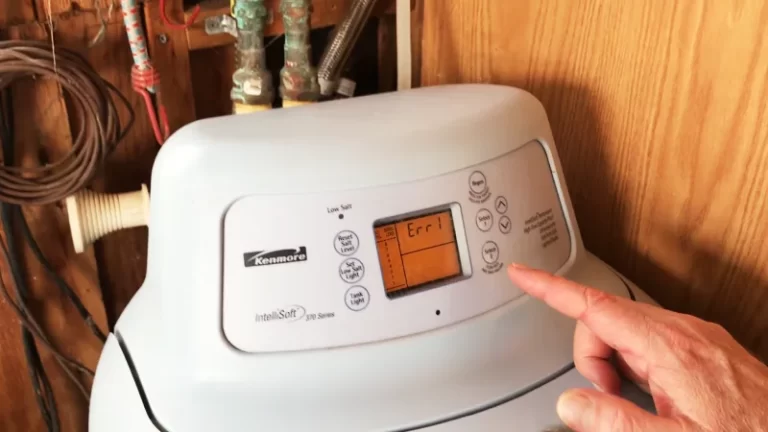Home Depot Water Test a Scam? The Truth Behind the “Free” Kit
You’ve seen them near the checkout lanes at Home Depot: small, seemingly helpful “free water test” kits. It feels like a responsible, proactive step for any homeowner. You grab one, fill the vial at home, and mail it in, expecting straightforward, scientific results about your water quality. The problem? What often follows is not clear-cut data, but a high-pressure sales pitch that can leave you feeling confused, alarmed, and significantly poorer.
Many homeowners report that this “free” test is the first step in a carefully orchestrated sales funnel. The goal isn’t just to inform you about your water; it’s to sell you an expensive, often unnecessary, whole-house water filtration system. This experience has led many to label the Home Depot water test a scam, designed to generate sales leads rather than provide unbiased water quality analysis.

You'll Learn About
The “Free” Water Test: What’s Really Happening?
The process usually starts innocently enough. You send in your water sample and, a short time later, receive a call. The person on the phone often delivers vague but concerning news: your water has high levels of “total dissolved solids” (TDS) or is “very hard.” They’ll then insist that a more thorough, in-home test is necessary to understand the full picture, and they can send a “water expert” to your home—often requiring both homeowners to be present.
This is where the situation shifts from a simple water test to an aggressive sales presentation. The “expert” who arrives is typically a commissioned salesperson. Their goal is to spend a significant amount of time in your home, conducting dramatic-looking tests and presenting information designed to create fear and urgency. They may use publicly available data about your local water supply to highlight contaminants, even if they are within legal and safe limits.
High-Pressure Tactics and Misleading Demonstrations
A common tactic involves a “precipitation” or “magic potion” test. The salesperson adds drops of a chemical to your tap water, which then turns a murky, unpleasant color. This is presented as “proof” of dangerous contaminants. In reality, this is a simple chemical reaction that causes harmless minerals, present in most tap water, to become visible. It’s a visual trick designed to shock you.
Following these “tests,” the salesperson will launch into a lengthy pitch about the dangers of hard water and other impurities. They’ll claim these invisible threats are ruining your appliances, drying out your skin and hair, and even putting your family’s health at risk. The presentation often concludes with an offer for a whole-house filtration or water softener system, frequently priced at several thousand dollars. To seal the deal, they may offer a “one-time-only” discount, valid only if you sign on the spot.
The Problem: Is It a Scam or Just Aggressive Marketing?
While selling a product isn’t illegal, many consumers feel the process is deceptive. A class-action lawsuit was even filed against Home Depot and one of its partners, RainSoft, alleging that the free water tests were misleading and didn’t actually test for water safety. The companies admitted the test was only meant to identify mineral content, not contaminants. The core of the issue is that customers believe they are getting a comprehensive, unbiased health and safety analysis of their water, when in reality, it’s a lead generation tool for a sales company.
Homeowners often report feeling pressured and manipulated. Salespeople can be very persistent, staying for hours and becoming visibly upset if you decline their offer. This high-pressure environment prevents you from doing your own research, comparing prices, or simply thinking over a major purchase. The focus is on creating anxiety to drive an immediate, expensive decision.
Are the DIY Kits on the Shelf Any Better?
Separate from the “free” mail-in service, Home Depot and other hardware stores sell DIY water testing kits. These kits typically use test strips or drops to check for common parameters like pH, chlorine, and water hardness. While more transparent, these DIY kits have their own limitations. Their accuracy can be questionable compared to professional lab testing, and they may not detect more serious contaminants like heavy metals, pesticides, or bacteria.
These kits can be a good starting point for identifying basic issues, but they shouldn’t be relied upon for a definitive assessment of your water’s safety. If a DIY test indicates a potential problem, it’s a good idea to follow up with a more reliable testing method.
How to Get Accurate and Unbiased Water Test Results
Protecting your family by ensuring you have clean, safe water is a valid concern. Fortunately, there are reliable ways to test your water without falling victim to a high-pressure sales pitch. The key is to separate the testing process from the sales process.
1. Contact Your Local Water Utility
If you receive your water from a municipal supply, your local water utility is required by the Environmental Protection Agency (EPA) to provide its customers with an annual water quality report, also known as a Consumer Confidence Report (CCR). This report details where your water comes from and what contaminants have been detected, as well as their levels. This is often the easiest and most cost-effective way to get a baseline understanding of your water quality.
2. Use a State-Certified Laboratory
For the most accurate and comprehensive results, have your water tested by a state-certified laboratory. The EPA’s website provides resources for finding accredited labs in your area. These labs use scientific methods and sophisticated equipment to provide precise readings of a wide range of contaminants. You can choose which specific contaminants to test for based on your concerns, whether it’s lead, arsenic, bacteria, or nitrates.
While this option comes with a cost, it provides you with unbiased, detailed data. With these results in hand, you can then make an informed decision about whether a filtration system is necessary and, if so, which type is best suited to address the specific issues identified in your water.
3. Reputable Independent Water Testing Companies
There are also companies that specialize solely in water testing and do not sell filtration systems. These companies can provide detailed analysis and impartial advice. They offer various testing packages and can help you interpret the results. This ensures that any recommendation for a filtration system is based on genuine need, not a sales quota.
| Testing Method | Pros | Cons | Best For |
|---|---|---|---|
| “Free” In-Store/Mail-In Offers | No initial cost. | Often a sales tactic, high-pressure pitches, results can be misleading. | Generating a sales lead for a filtration company. |
| DIY Home Test Kits | Inexpensive, provides instant results for basic parameters. | Limited accuracy, doesn’t test for all contaminants. | Quickly checking for basic issues like hardness or chlorine. |
| Local Water Utility Report (CCR) | Free, provides a good overview of the municipal water supply. | Doesn’t test the water inside your specific home’s plumbing. | General understanding of your city’s water quality. |
| State-Certified Laboratory | Highly accurate, comprehensive, and unbiased results. | Costs money, takes time to get results. | Getting a definitive and trustworthy analysis of your water quality. |
Red Flags of a Water Test Scam
Whether you’re approached by a door-to-door salesperson or follow up on a “free” offer, be wary of these common red flags:
- High-Pressure Sales Tactics: Any offer that is “only good for today” is a major warning sign. Legitimate businesses will give you time to consider your options.
- Scare Tactics: Salespeople who use fear-based language about “dangerous” water without providing certified lab results are likely trying to manipulate you.
- Impersonating Officials: Some scammers may claim to be from a government agency like the EPA or your local water utility. These agencies do not send representatives to sell filtration systems.
- The “Magic Potion” Test: If a salesperson adds drops to your water that cause it to change color, this is a common trick and not a valid scientific test for harmful contaminants.
Concerns about home safety are common for any homeowner. Whether you are worried about your water quality or wondering is spackle toxic after a recent repair project, it is always best to seek information from unbiased, expert sources rather than a salesperson.
What If You Actually Need a Water Filtration System?
After getting your water professionally tested, you might find that you do need a filtration system. Hard water, for example, can cause issues like soap scum buildup and may make you wonder if you should replace grout with caulk in shower areas to prevent mineral stains. High levels of certain contaminants could also be a health concern.
If you determine a system is needed, take your time to research your options. Compare prices from multiple reputable plumbing and water treatment companies. Look for systems certified by organizations like the NSF (National Sanitation Foundation), which verifies that a product meets strict public health standards. Don’t be rushed into a decision by a salesperson who happened to be in your home for a “free” test. Even minor home annoyances, like when a shower curtain gets stuck on rod due to mineral buildup, can be solved with much less expensive solutions than a whole-house system.
Conclusion: Trust, but Verify
While the initial offer of a free water test from Home Depot may seem harmless, it’s crucial to be aware that it is often a gateway to a very persuasive and expensive sales pitch. The tests performed in your home are frequently more about theatrics than science, designed to create alarm and push you toward a quick purchase.
To truly understand your water quality, skip the “free” offers and go straight to reliable sources. Obtain your local Consumer Confidence Report, and for a definitive analysis, invest in testing from a state-certified laboratory. This approach empowers you with accurate, unbiased information, allowing you to make a clear-headed decision about your family’s water safety without the pressure and questionable tactics of a commissioned salesperson. Your peace of mind is worth more than a “free” test.

